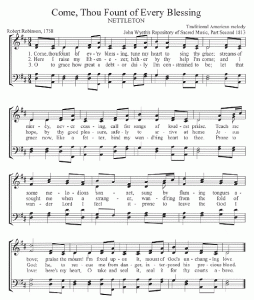 I’m grateful for your response to the sermon and worship planning article from last week’s Currents. And….. The response inspired me to add this article on the subject of music .
I’m grateful for your response to the sermon and worship planning article from last week’s Currents. And….. The response inspired me to add this article on the subject of music .
First of all, it is instructive to see how much “music” impacted the lives of the ancients. In the beginnings of civilization Genesis tell us of Jubal who, “was the ancestor of all those who play the lyre or flute,” Genesis 4:21. We find out in 1 Samuel 16 that David provided musical comfort for Saul by playing the lyre for him.
Psalms is full of music, including the notation “selah” (thought to be a musical notation) which appears 71 times in 39 of the Psalms. Typical of the music of the Psalms, Psalm 33 begins, “Rejoice in the Lord, O you righteous…Praise the Lord with the lyre; make melody to him with the harp of ten strings.”
After the Temple was destroyed in 596 BC, use of musical instruments ceased and singing in the synagogue was acapella. Scholars think the early Church also adopted this form. This is helpful information because it helps to show how dynamic and adaptable musical practices have been, over the centuries.
Not a great deal is said about music in the New Testament other than two passages, Ephesians 5:18-19 and Colossians 3:16-17. In these two passages Paul indicates the following:
- Being filled with the Spirit and thereby singing to God is to be desired over getting drunk, which Paul says is debauchery. This is a strong statement by Paul about what should control our inner lives – not alcohol but the Spirit.
- In Colossians Paul tells the church to let God’s word live richly within them, that is, in their hearts. He instructed them to teach others and to sing with gratitude. These three practices go along with their community life.
Music in the Bible was not four-part harmony; it was chanting – further indication of how music has evolved. And it continues to do so. Not many years ago music was taken, with musical notation, from a hymnal; now the words only are projected on a screen and most singing is in unison. In the 1700’s four-part harmony was taught in Sacred Harp (the voice) schools on the east coast and led to hymnals with their soprano, alto, tenor, and bass lines. [See the picture above.]
I would say that there are some biblical commonalities in music. The first is that it should be God-directed. Music is not performance art like at the modern-day concert, not meant for the entertainment of an audience.
Also, music and worship is not about ME. Sadly, however, much of what masquerades as Christian music would have no content if you removed the personal pronoun. Every generation has had its own version of this struggle. For example, 1949 song, “Mansion over the Hilltop,” sings, “I’m satisfied with just a cottage below, A little silver and a little gold, But in that city, where the ransomed will shine, I want a gold one, that’s silver lined.”
I call it the “I want, I want, I want” song. But it has little to do with worshiping God. The personal pronoun often gets in the way of that. Put the personal pronoun test to songs, and you might be surprised.
Finally, music has a two-fold purpose. The first is that God is its object. The second is that it is to be a way whereby the members of the body of Christ teach one another and are encouraged in their discipleship.
Remember that when you sing, there are two audiences: God is the primary audience and the brother or sister sitting nearby who is being encouraged by your singing is the secondary audience. If a hymn directs you to think too much about yourself, you may have misplaced attentions. A funny video is attached to illustrate, in extreme and humorously, what self-centered worship sounds like.
